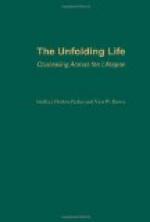The child’s needs are also a guide in this matter. The soul is growing in every direction, intellectually, emotionally, and spiritually if properly nurtured, and memory holds the constantly increasing food for its growth. Is it to be treated as a stockroom, where packages unavailable for the present are to be laid away until needed, or as a store-house supplied with nourishing food for the present? If memory is a stockroom, then it should be filled with definitions, statements, terms, facts, anything which may be needed sometime. This can be done, for the brain will retain the sound of the words, but meantime, what shall the child feed on? What shall he use? The soul can feed on or make use of only that which is at least partially understood. This means largely the concrete, for abstract statements can be understood only through the experience or reason, and the child has meagre resources in either direction. Only when a thought embodies what he has experienced, can he grasp and use it.
Is it not the work of nurture to see that memory is provided with that out of which it can supply every need of the developing life today? That, “Faith is the assurance of things hoped for, the evidence of things not seen,” may mean much to his mature heart, but what if the child should be frightened tomorrow and need to have his budding faith strengthened from memory? Would not the story of God’s care over the baby Moses, Jesus’ care for the disciples in the blackness of the storm, with the words, “He careth for you,” if these were stored in memory, quiet more quickly the beating heart, and more surely increase his faith? True nurture will not starve life in the present to hoard for the future. Memory now requires all its store for immediate use. Later, after growth is well under way in every direction, memory not only can supply present needs, but it will also demand a surplus for future use.
The second question, relating to the permanency of these impressions, is answered in meeting the following conditions:
1. A healthy, non-fatigued brain when the impression is made.
2. Close attention.
3. A clear, easily understood and forceful presentation of the thing to be remembered.
4. The use of as many senses as possible. When an impression has been given through eye and ear and touch, for example, it is more definite in the mind than when it has come only through the sense of hearing.
5. A natural association of the new impression with others well known and interesting to the child.
6. Immediate and frequent recall.
CHAPTER IV
The period of early childhood—Concluded




